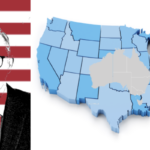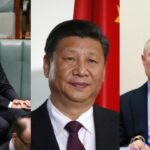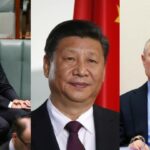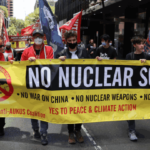A Complete Clusterfuck: Illegal Munitions, North Atlantic Expansion and Vassal States

At the White House last Friday, US national security advisor Jake Sullivan dropped it on the globe that the Biden administration, despite its having held off for a long as it could, will now be supplying the Ukrainians with cluster munitions to toss at Russians within its own territory.
“We recognise that cluster munitions create a risk of civilian harm from unexploded ordnance. This is why we’ve… deferred the decision for as long as we could,” Sullivan publicly justified, adding that if it doesn’t hand over the bombs, Russia may gain territory and “that is intolerable to” the US.
But Sullivan neglected to address the fact that 111 nations have agreed to comply with an international cluster bomb prohibition, which entered into force in 2010, with the aim of preventing the “humanitarian consequences and unacceptable harm to civilians caused” by these weapons.
And some have said, as Sullivan did, ‘but Russia has been using cluster bombs since the beginning of the war’, while others have counted, that according to Human Rights Watch, evidence pointed to Ukrainian forces having used such weaponry domestically in 2014.
None of this, however, has provided valid justification as to why the US, a nation with a horrid legacy of cluster bomb use, should continue to propagate such use, and neither does it point to the silence of the Albanese government on this matter, especially as our nation is a party to the prohibition.
Uncle Sam’s old tricks
Adopted in 2008, the Convention on Cluster Munitions, which prohibits their use, outlines that a cluster bomb is “a conventional munition that is designed to disperse or release explosive submunitions”, which then scatters the surrounding landscape with these lethal bomblets.
And with no way to guide their course, these devices cause an obvious civilian threat on use, but the reason why this use poses such an enduring harm is that many bomblets don’t explode on release and rather clutter the land with deadly objects that can kill literally decades after dispersal.
The United States is notorious for its unbridled use of cluster bombs during the Vietnam War.
According to the Landmine and Cluster Bomb Monitor, between 1965 and 1973, the US dropped 413,310 tonnes of cluster munitions on Vietnam. But a lesser-known fact is that Washington also densely scattered Cambodia and Laos with such devices, whilst not even at war with those nations.
Operation Barrel Roll saw the US secretly drop 260 million cluster munitions, or 2 million tonnes, over Laos during the war. And to this day, the nation remains the most heavily bombed per capita in history, along with its holding the title for having the landscape most scarred by unexploded bombs.
This is the legacy that makes the decision of the White House to supply Ukraine with cluster bombs, as part of an $800 million dollar military “aid” package, all the more sinister. And significantly, neither Washington, Moscow nor Kyiv have signed the international treaty ban.
The rationalisation for annihilating future generations
During a 28 February 2022 press briefing, White House press secretary Jen Psaki said, in response to a question about reports that Russia had been using “illegal cluster bombs” in Ukraine that “if that were true, it would potentially be a war crime”.
However, that rough assessment doesn’t seem to apply to the supply of the opposing side with such weaponry. Indeed, in a statement sent out on the day of the announcement, US secretary of state Anthony Blinken said cluster bombs were “essential to strengthening Ukraine’s brave forces”.
Meanwhile, Sullivan was in the White House press briefing room explaining why the US provision of cluster bombs to Ukraine to use on its own territory, wasn’t the same atrocity as the Russian military’s use of the same weaponry has been since the beginning of the war.
“Russia has been using cluster munitions with high dud or failure rates of between 30 and 40 percent,” the security advisor explained. “The cluster munitions that we would provide have dud rates far below what Russia is doing — is providing — not higher than 2.5 percent.”
Mind you, back in 2009, US congress did pass a law banning the use or transfer of cluster munitions with a dud rate of over 1 percent, but, luckily, the US president, whether that be Biden or Trump, can waiver this clause and continue with the annihilation of civilians as need be.
Sullivan further assures that “Ukraine is committed to post-conflict de-mining efforts to mitigate any potential harm to civilians”, which “will be necessary regardless of whether the United States provides these munitions or not because of Russia’s widespread use of cluster munitions”.
And by the way, “the difference between Russia using its cluster munitions to attack Ukraine and Ukraine using cluster munitions” is that the latter will be using these weapons “to defend itself” and “its citizens” on its own “sovereign territory”.
The vassal state of Australia
Leaders from the UK, Spain, Canada and the United Nations have all condemned Washington’s decision to supply cluster bombs to Ukraine. The Albanese government, however, has stayed silent on this issue, despite our nation having ratified the international prohibition.
Of course, as part of the AUKUS arrangements, Australia is playing such a prominent role in the build up to war on China that criticising its senior partner in the Indo-Pacific Anglocentric security pact isn’t a feasible direction to take, especially now that our leaders are being invited to all the parties.
This week, for the second time, Albanese, as part of the NATO Indo-Pacific four partner states – Australia, Japan, South Korea and New Zealand – was in attendance at the summit of the North Atlantic Treaty Organisation in Lithuania.
And on the agenda at this week’s discussions was NATO expansion: whether Sweden could enter the alliance, should the Ukraine be admitted, and what about opening a NATO office in Asia, say, in Japan. And whilst Stockholm can join NATO, Kyiv has to wait, and the Tokyo idea has been shelved.
Biden says Ukraine is not ready to join NATO, especially as immediately joining would mean that the North Atlantic alliance would suddenly be at war with Russia. So, instead, in the interim, the US and its allies will continue to supply Kyiv with the weapons to combat Moscow’s illegal invasion.
Yet, if his assessment is right, the “leader of the Free World” has described a situation where the US and NATO are already in something of a proxy war with Russia.
And if that is the case, where does this situate our nation, in terms of prime minister Albanese’s claim that we’re the “largest non-NATO contributor” to the Ukrainian war effort?
And does the Australian silence on cluster munitions then make us somewhat complicit in the White House decision to supply to Kyiv, especially as this country now has its military running with ever-increasing interoperability with that of the United States?







